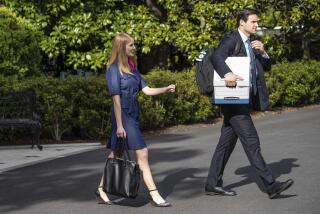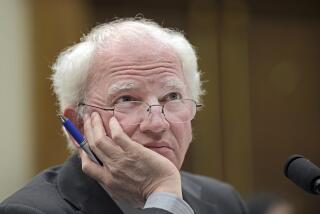Nofziger Aide Challenges Letter Offered as Evidence at His Trial
- Share via
WASHINGTON — Lyn Nofziger’s secretary said Friday that she almost certainly did not type--and Nofziger did not sign--a letter that is the basis for one of four illegal-lobbying counts against the former White House aide.
Prosecutors claim that Nofziger sent the letter, signed “Lyn” on his company stationery, to a former White House colleague in 1982 as part of an effort to win a no-bid Army contract for the scandal-rocked Wedtech Corp.
Nancy Guiden, testifying for the defense at Nofziger’s trial, said the signature did not appear to be that of her boss. Although the initials LN/ng appear at the bottom, she maintained that various aspects of the letter, including the lack of a date, were not her typing style.
Doesn’t Recall Letter
“I have no memory of this letter at all and I do not believe that I typed it,” she said.
Defense attorneys hoped the testimony would suggest to jurors that the letter may have been written by another Wedtech lobbyist, Stephen Denlinger, who admitted he drafted several earlier versions and was in a hurry to deliver it to the White House.
The letter, received May 28 by James E. Jenkins, deputy to Edwin Meese III, then-presidential counselor, asked that written assurances of a contract for Wedtech be obtained from the Army so that the New York firm could qualify for financial aid from other government agencies.
Within months, Wedtech received both $5 million in financial aid and the $32-million contract to build small engines at its plant in the South Bronx.
Nofziger Had a Stroke
Prosecutors have raised the possibility that Nofziger, who was at home recovering from a stroke at the time, may have had the letter brought to him for signature or that he authorized a secretary to sign it for him.
FBI handwriting analyses have been inconclusive.
Nofziger resigned as President Reagan’s political director in January, 1982, to become a lobbyist. He is charged with violating a conflict-of-interest law that restricts lobbying by former government officials at their former agencies.
The defense called two other witnesses Friday to rebut charges that Nofziger made illegal contacts in 1982 on behalf of an aircraft manufacturer and a labor union.
Stanton D. Anderson, whose law firm shared a Washington town house with Nofziger’s consulting firm, testified that Fairchild Republic Corp. had him hire Nofziger to help secure continued federal funding for the A-10 warplane.
$50 Million Released
Anderson said he had Nofziger arrange a White House meeting with two National Security Council aides, who in turn wrote a memo to higher-ups. Eventually, the Pentagon released $50 million to keep A-10 production alive for several months.
But until Nofziger got involved, Anderson said, the A-10 was “not an issue they (White House officials) were really interested in.” That statement bolstered Nofziger’s contention that he was not covered by the 1978 Ethics in Government Act. The law barred him from lobbying ex-colleagues only on matters of “direct and substantial interest” to the White House.
Defense lawyers had wanted Anderson to testify also that, acting as Nofziger’s attorney, he told him it was all right to lobby for Fairchild. That would have given Nofziger a stronger defense against the felony count.
But U.S. Dist. Judge Thomas A. Flannery agreed with Merrick Garland, assistant independent counsel, that the testimony could not be given to the jury because Anderson was serving as Nofziger’s fellow lobbyist, not as his attorney.
More to Read
Sign up for Essential California
The most important California stories and recommendations in your inbox every morning.
You may occasionally receive promotional content from the Los Angeles Times.













